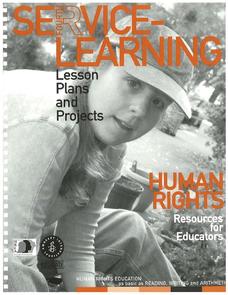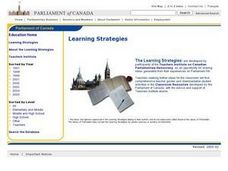Teaching Tolerance
The True History of Voting Rights
Explore what voting rights really are in an intriguing lesson that explores the history of American voting. The resource examines the timeline of voting rights in the United States with group discussions, hands-on-activities, and...
DC Vote
One Kid, One Vote
Learn about why the citizens of Washington, D.C. feel unrepresented in Congress with an article about D.C voting rights. Individuals read about the movement toward congressional representation in Washington, D.C., before answering...
City University of New York
Jim Crow and the Fight for Civil Rights
The history of voting rights in America has always been rocky, especially in the time period after the Civil War. Learn about the ways that Jim Crow laws affected the voting rights of African Americans with a activity featuring primary...
PBS
Voting Rights History
Why is voting so important, anyway? Learn more about the importance of exercising a right for which many men and women marched, fought, and legislated with an interactive timeline activity.
DocsTeach
The Path of Justice: Selma and the Voting Rights Act
The civil rights movement: An ongoing battle for change. The activity focuses on President Johnson's speech in response to the massacre at the Selma March. Academics study the speech, complete a hands-on-activity, and discuss President...
Museum of Tolerance
Making Lemonade: Responding to Oppression in Empowering Ways
An activity focused on tolerance encourages class members to consider how they might respond when they or someone else is the target of oppression and discrimination. After researching how some key figures responded to the anti-Semitism...
Carolina K-12
Get Out the Vote!
What better way to have a class learn about get out the vote campaigns than by having them create one themselves? After introducing get out the vote efforts and why they exist through videos, articles, and discussion questions, the...
Center for History Education
Women's Rights in the American Century
Today, many young people find it hard to understand why it took over 150 years for women in the United States to get the right to vote—why there was even a need for the suffrage movement. As they read a series of primary source...
Amnesty International
Human Rights and Service Learning (Part 1)
What better way is there to teach about human rights than by seeing them firsthand? Introduce your class or club to the spirit of service through a myriad of service project ideas. First in a series of human rights instructional...
Curated OER
Race and Voting in the Segregated South
High schoolers examine the history of African American voting rights. In this voting rights lesson, students listen to a lecture on African American voting rights between the years 1890 and 1965. High schoolers respond to discussion...
Curated OER
Who Can Vote? Chart
Students become familiar with historic and contemporary issues connected to voting rights around the world. They research the voting rights history of their country and then compare information about voting rights in at least three...
Curated OER
Women Get the Vote!
Students research the history of United States voting rights to describe and analyze why voting rights and responsibilities are important. They investigate famous suffragists like Susan B. Anthony and then create a "wanted" poster and...
Indiana Department of Education
Voting: It's Not a Spectator Sport!
Why is it important to vote? Who is eligible to vote? Why is it that some eligible voters do not vote? Class members conduct interviews with adults and other school mates before researching the eligibility requirements for their state,...
ProCon
Voting Machines
Does technology always mean advancement? Scholars take a close look at the use of voting machines. Does using a machine make voting more effective? Readers consider the advantages and disadvantages of the current voting process. They...
US House of Representatives
Keeping the Faith: African Americans Return to Congress, 1929–1970
The third lesson in a unit that traces the history of African Americans serving in the US Congress examines the period from 1929 through 1970. After reading a contextual essay that details the few African Americans elected to Congress...
Encyclopedia Britannica
Write an Election Day Letter
For some, getting to the polls to vote is no easy task. Voting may mean needing to choose between a job and civic duty. But what if Election Day was a national holiday? After reading an article about the pros and cons of designating...
Curated OER
The Bill of Rights: Debating the Amendments
Provide your class with an opportunity to investigate an important historical document. Without identifying the document, distribute copies of the original Bill of Rights, as transcribed by John Beckley, Clerk of the House of...
Constitutional Rights Foundation
Plyler v. Doe: Can States Deny Public Benefits to Illegal Immigrants?
Illegal immigration is an ever-changing source of consistent controversy. A reading passage about the rights of undocumented workers and illegal immigrants—and the lack thereof—guides high schoolers into a mock trial activity. Three...
Curated OER
A Brief History of Women in America
The story of women throughout American history is fascinating. Travel the path from domestic slave to the modern day with advocates such as Susan B. Anthony, the Grimké Sisters, and Gloria Steinem. A wonderful presentation that shows how...
Humanities Texas
Primary Source Worksheet: Lyndon B. Johnson, Excerpt from “To Fulfill These Rights”
"Equal opportunity . . . is not enough." Johnson's 1965 commencement address to the students at Howard University provides an opportunity for participants to see how education was a key element in his vision for civil rights.
Deliberating in a Democracy
Voting
Young scholars read about voting rights and compulsory voting in democracies. For this voting rights lesson plan, young scholars analyze the reasons for supporting and opposing compulsory voting and discuss whether compulsory voting is...
EngageNY
Main Ideas in Informational Text: Analyzing a Firsthand Human Rights Account for Connections to Specific Articles of the UDHR
Lesson 10 in a series of human rights lessons focuses on the skills of finding evidence and summarizing. Your young readers work to compare the two texts they have read in this unit: the Universal Declaration of Human Rights...
National Park Service
The Selma to Montgomery Voting Rights March: Shaking the Conscience of the Nation
Travel back in time to examine how tragic events can spur positive change. Scholars explore the impact of the Selma Voting Rights March, including the tragic loss of life and the later signing of the Voting Rights Act of 1965. Academics...
Curated OER
The Voting Game
Upper graders play the voting game to help them understand voting patterns, political movements, and build a content specific vocabulary. Each student creats a chart to determine if his or her political view veers liberal or...

























